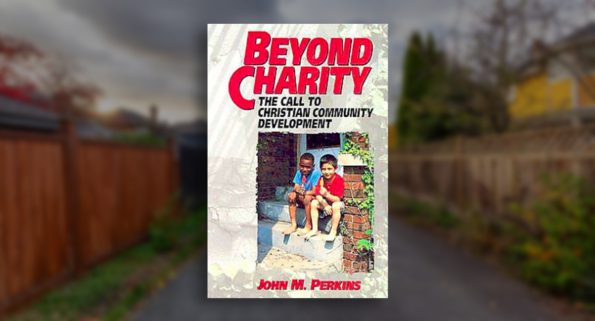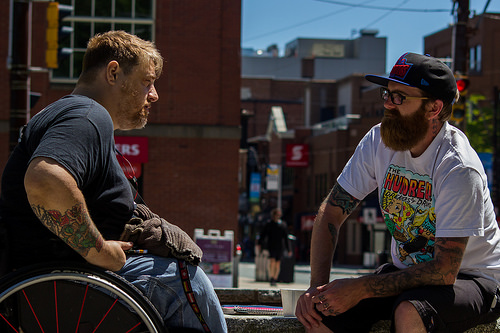Beyond Charity – The Call to Christian Community Development
by John Perkins, 1993
A brief summary with excerpts by James Whitford
In Beyond Charity, Dr. John Perkins calls for the church to exercise solidarity with the poor through incarnational ministry as the pathway to development and true alleviation of American urban poverty. Repeatedly, he points out the state’s failure in helping the poor and calls the church to step up and fill the void:
“Despite good intentions, AFDC has helped to forestall and break up more black families than anything since slavery’s auction blocks sold husbands, wives and children in different directions.”
“In confronting these conditions, it is much easier to build a new prison or enact a new welfare law or give someone a handout then it is to develop the person. So far, we have settled for the impersonal and the bureaucratic. But, as we are seeing now, in the long run these Band-Aids will be much more expensive than we ever imagined.”
“Ultimately, however, we cannot look to the government to solve the problems of the urban poor. Rather we should take that as the responsibility of Christians.”
And Dr. Perkins certainly doesn’t pull any punches concerning that responsibility.
“It is time for the church, yes, the whole church, to take a whole gospel on a whole mission to the whole world.”
“Our mission is to open doors and invite pain and suffering in; Jesus did not absorb pain from a distance and neither can the church.”
“If the church will ever authenticate its claim to be “the answer, the way, the good news,” then we will prove that claim, as Jesus did, among the poor and oppressed.”
“Not only is the slum dehumanizing to the people who dwell there, but a failure to respond to the slum is an indictment on the church.”
And he quotes Robert Lupton concerning the church:
“It is ordained to give itself away, yet without loss. The church, above all earthly symbols, bears the responsibility for declaring in the outpouring of resources, the utter dependability of God. To preserve its life is to lose it.”
But he does not neglect fair warning for the church concerning proper stewardship of that charity. Rather he exhorts her to go beyond “feel good” charity:
“… acts of charity can be dangerous because givers can feel good about actions that actually accomplish very little, or even create dependency.”
“Undisciplined giving can be just as destructive as the poverty it was meant to alleviate.”
“We cannot hope to find our self-worth through our work. If we do, we are actually using the poor to advance our good feelings about ourselves.”
Neither does Dr. Perkins disappoint the reader hoping for “how to” direction. The book goes beyond philosophy as he works to instruct and equip the reader with technique. Certainly his three R’s are a take home: Relocation, Reconciliation and Redistribution. Concerning the last of the three, this reviewer wouldn’t consider Dr. Perkins a “redistributionist” in the classical sense. Although he does make one reference in advocacy of a nationalized health care plan, he is more so a redistributionist in the purest sense; that in which one’s giving is compelled through Christian conviction and obedience:
“Christ calls us to share with those in need including our skills, technology, and educational resources in a way that empowers people to break out of the cycle of poverty.”
Concerning relocation:
“…we must put ourselves in a place where believers are asking God to incarnate his love in them in order to address the needs around them.”
And concerning reconciliation, this is one of many remarks:
“To reconcile people to God and then to each other is the purpose of the gospel. This is the theology that is the true work of the church.”
Dr. Perkins’ strong feelings concerning the importance of the ministry of reconciliation coincide with his insistence that social works and evangelism should never be separated. In this particular area of the book’s discussion, this reader felt the author issued a subtle rebuke to welfare programs and social justice works that have no Christian mission:
“Evangelism and social responsibility are two sides of one coin. They are inseparable.”
“Jesus never put evangelism and social action at odds with each other, so neither should we.”
“Our ministries, our youth programs, our health centers, our housing projects, our evangelism- all these actions must be motivated out of a love for God.”
In summary, Dr. Perkin’s work resounds that superficial charity has failed and is destined to leave the urban poor without the wholeness that welfare programs, social services and churches often hope to deliver through the simple distribution of material goods and services. Rather, his book boldly challenges any act of charity that shies from the Christian’s Cross- that place where self is lost, love is delivered and life is gained. This Chinese poem quoted in chapter 2 “Quick Fixes and Felt Needs” is fitting to conclude:
Go to the people
Live among them
Learn from them
Love them
Start with what you know
Build on what they have
But of the best leaders
When the task is done
The people will remark
“We’ve done it ourselves.”
Beyond Charity can be purchased at Amazon. If you purchase the book through this link, True Charity will earn a small amount as an Amazon Associate

This article is just the tip of the iceberg for the practical resources available through the True Charity Network. Check out all of the ways the network can help you learn, connect, and influence here.
Already a member? Access your resources in the member portal.




